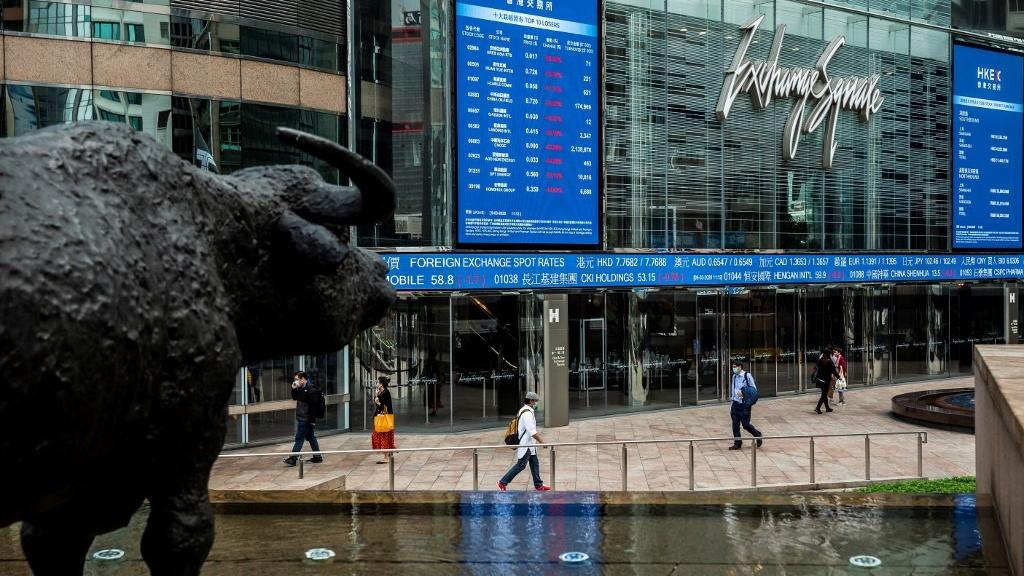 Electronic boards display various stock prices at Exchange Square in Hong Kong on March 9, 2020.
(ISAAC LAWRENCE / AFP)
Electronic boards display various stock prices at Exchange Square in Hong Kong on March 9, 2020.
(ISAAC LAWRENCE / AFP)
Trading and subscription in special purpose acquisitions companies, or SPACs, will be limited to professional investors, the Hong Kong Exchanges and Clearing proposes Friday in a much-awaited consultation paper, which outlines stronger criteria than that in the United States.
READ MORE: HK to launch consultation on SPAC listings in third quarter
A SPAC is typically a newly formed company with neither assets nor operations. They offer investors units of common stock and warrants, due to illiquidity. Warrants are priced higher than the initial public offering price. After the listing, the common stock and warrants are traded separately and IPO proceeds are placed in a trust account. Sponsors of SPACs get 20 percent of common stock. This is known as “founder’s shares’’.
The HKEX says a strict approach will help “ensure only SPACs with experienced and reputable promoters are listed that seek good quality De-SPAC targets’’
The HKEX’s proposed high entry point in the consultation paper comes in the wake of closer scrutiny of these speculative companies in the United States by financial regulators, lawmakers, and the Federal Reserve. In April, the US Securities and Exchange Commission issued strict guidance on accounting issues related to SPACs.
The Hong Kong bourse operator proposes that a SPAC must distribute each of SPAC shares and SPAC warrants to a minimum of 75 professional investors. Among them, 30 must be institutional professional investors.
This proposal on professional investors is among 10 key items outlined in the consultation paper, which will seek views of stakeholders until end October.
The HKEX says a strict approach will help “ensure only SPACs with experienced and reputable promoters are listed that seek good quality De-SPAC targets’’.
ALSO READ: Hong Kong 'targeting first SPAC listing by end of year'
De-SPAC is the process of wrapping up the business combination with the private company target.
“We propose that the securities of a SPAC be marketed to and traded by professional investors only prior to the completion of a De-SPAC transaction. This will mean that the number of investors who are eligible and willing to subscribe for the shares of a SPAC in its initial offering will be much smaller than the number of investors in a typical IPO, as non-professional investors will not be able to subscribe,’’ the HKEX says.
There are no investor restrictions in the NYSE, Nasdaq and London for SPAC investors. In the NYSE and Nasdaq, SPACs have a unit issue price of US$10. There is no minimum fund raising size, but a minimum market capitalization of US$50 million is required. London sets a £100 million (HK$1.1 billion) minimum in terms of aggregate gross cash proceeds raised.
Singapore has not proposed restrictions on investors either. Retail investors are allowed to participate in the IPO.
Early euphoria on SPACs this year has waned in the US.
In August, S&P Global Market intelligence reported that SPAC initial public offering activity “significantly slowed’’ in the US in the second quarter. These vehicles raised US$16 billion in capital in 110 IPO transactions.
S&P said activity has dropped by 85 percent from the earlier quarter, although this is the fourth-largest quarterly volume of SPAC issuance in the past four and a half years.
Reputed law firm, Mayer Brown, estimates that in 2020, US-listed SPAC volumes shot up by 275 percent year over year to an all-time high of US$51.5 billion.


